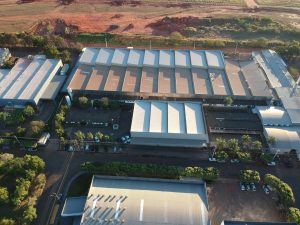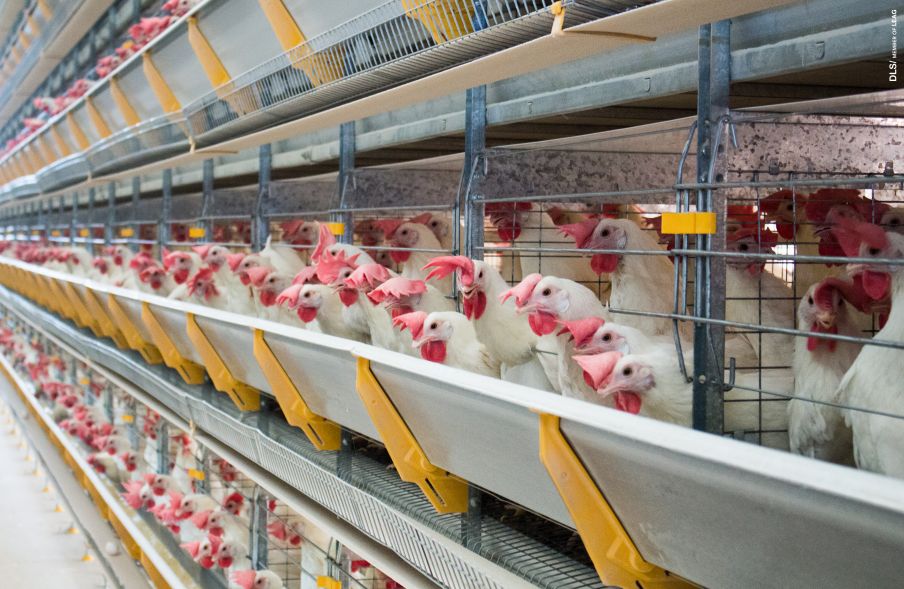São Paulo – The Brazilian poultry farming equipment manufacturer Kilbra, which supplies Arab countries, is working to step up sales and find its way into new markets across the region. Prospects are good for the industry, as shoppers turn to affordable foods such as eggs, and the Covid-19 pandemic prompts countries to invest in domestic food production.

Kilbra manufactures and installs systems for layer hens of all ages. “The equipment is developed to provide technology, efficient production and comfort to the fowl,” CEO Paulo Wesley Moterani said in an interview with ANBA.
One of Kilbra’s flagship products is KM 2000, a vertical automated system featuring wire or plastic partitions. The system automatically apportions food and collects droppings as well as the eggs. The structure is built from galvanized sheets, and the conveyor belt which collects the droppings is polypropylene, which makes it last longer.
Also available is the KM 353, a pyramid-shaped system for chickens of all ages featuring automated egg collection. The droppings fall through the elevated bottom portion of the cages and on to the floor. The KM 737 is a vertical system for young and adult quails. It is a lower-height version of the KM 2000.

Kilbra’s monthly output capacity is enough to rear as many as 600,000 animals, its CEO said. The bulk of sales are made domestically, with exports accounting for 20% of total business. The company ships product to over 20 different countries, and Latin America is its biggest foreign market.
Kilbra has been selling to the Arab countries for seven years now, primarily to Algeria, Tunisia and Morocco. The best-selling product across the region is the KM 2000 with integrated air conditioning for warehouses. The company has a sales representative of Moroccan background, which makes for easier interfacing with Arab importers.
An Arab Brazilian Chamber of Commerce (ABCC) member company, Kilbra plans on working to do more business in Arab countries and to find its way into new markets such as Saudi Arabia and Qatar. Moterani believes that there is a market for the KM 2000 in those countries. “We believe that every market is a good market, because demand for eggs is growing exponentially everywhere.”
As a case in point he mentions Brazil, where consumption went from 190 eggs per capita in 2000 to 250 units at this time. With a population of 210 million, that means 12 billion eggs more. Moterani also sees demand going up in the Arab countries, with some governments providing incentives to local egg farming in a bid to avert import-related charges.

The CEO expects the pandemic to bring about a shift in national consumption habits. Stepping up local production will make countries less dependent on imports, not to mention potential customs barriers or the shutting off of markets, he says. Consumption will tend to keep climbing, since eggs are cheap and accessible. “As the pandemic chips away at purchasing power in some countries, eggs are becoming an affordable, sustainable solution, and that leaves us with an even stronger market, investment-wise,” he says.
The company installs its systems to match customers’ specifications. Kilbra is a world leader in stainless steel equipment, which are more durable. Its trademark innovations include equipment controlled by programmable power boards, with no need for human contact with the eggs; dropping collection with a scraping system to ensure thorough cleanliness; automated egg counts; conveyor equipment to get eggs out of warehouses without breaking; air conditioning; etc.
An industry leader, Kilbra is based in Birigui, São Paulo. It relies on a 190-strong staff, plus third parties for installation. Kilbra was founded in 1970 by entrepreneur Osvaldo Moterani. Management is about to be turned over from the family’s second to third generation. Aside from CEO Paulo, family members include José Wilson, commercial director, and Renan, a third-generation Moterani.
Quick facts
Kilbra
Website
Tel.: +55 (18) 3643 3240
Email: kilbra@kilbra.com.br
Translated by Gabriel Pomerancblum




